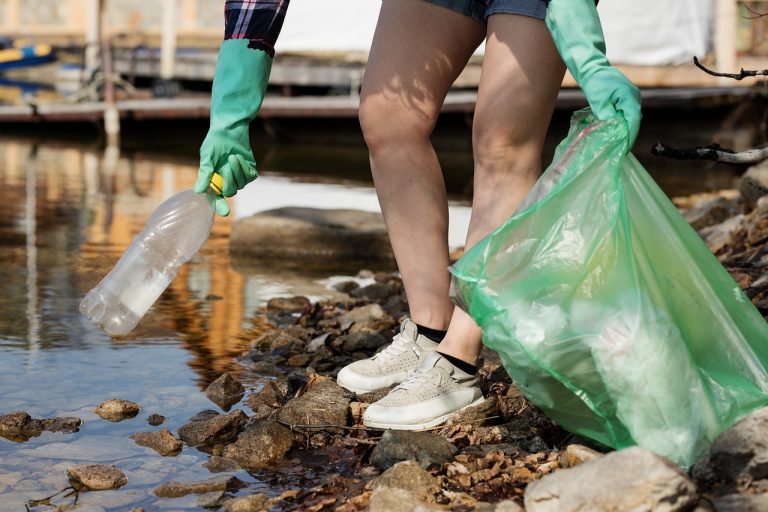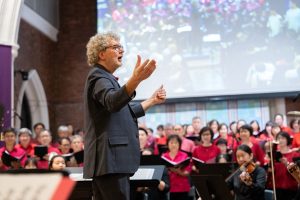(This article was first published in Wesley TIDINGS, September 2019 issue.)
Nowadays, terms like ‘environment’ and ‘green’ are frequently used, often carelessly, in the urgent effort to safeguard our planet and all of creation.
As Christians, we should commit to reducing our carbon footprint not simply because we are constantly bombarded by news of marine animals dying, sea water levels rising, global warming, changing weather patterns and toxic landfills — we care for our environment because God has commanded us to do so. This world belongs to God — “The earth is the LORD’s and everything in it” (Ps 24:1) — and it is not for us to overuse, abuse, and destroy it.
Becoming a Green Family
About four years ago, my younger sister, Kate, began to get increasingly involved in environmental causes. She is a vegetarian and a strong advocate for all things environmentally friendly, helming her own environment-centred blog and online selling platform of green products. Additionally, she often writes to F&B (Food and Beverage) companies to petition for a reduction in their use of straws.
Therefore, as much as it initially troubled my mother who is fastidious and finicky about organising things in the kitchen with plastic containers in all shapes and sizes, our family had little choice but to try to become a greener family to support the cause championed by my sister.
We had begun our green endeavour by attempting to reduce our carbon footprints through the smallest of actions — using less paper, conserving energy and reducing our use of plastic. Prior to that, my parents, who both love planting, had already tried to grow a variety of vegetables and plants around the house, and they were also into reducing food waste. These ideas, though simple enough, had initially sounded rather lofty — they were in reality a tad challenging to practise in a society that values time and convenience more than anything else. After a few months, however, we started to care for our environment without even realising it.
Our main goal is to reduce the use of plastic in our daily lives. No one can completely eliminate plastic use in our lives. Plastic is a necessity in many things and it is also strong, durable and does not degenerate easily. They will be around long after our grandchildren and great-grandchildren are gone. However, we also know that single-use items like plastic containers account for more than 40 percent of plastic waste. This waste endangers wildlife, pollutes the water, and puts human health at risk.
Yet it is virtually impossible for anyone to totally eliminate plastic from our life. The real question then is this: What can we do to begin a lifestyle that is less dependent on plastic? The key idea is to try to be more mindful of our lifestyle — how we consume, use and dispose resources, especially single-use plastic.
Steps to Reduce Plastic Use in My Family
Here are some of the little steps we are taking as a family to reduce the use of single-use plastic.
1. My entire family, including my parents and grandmother, mostly carry our own shopping bags when we go out. My parents and helpers make it a point to bring their own bags to the supermarkets.
2. We reuse every possible scrap of plastic, including the plastic wrappers that come with the food we purchase or free magazines in the mail. For example, we re-use the plastic wrapping that comes with commercial bread to line our smaller bins.
We also ensure that the plastic bags used to line our bins at home are completely filled before the trash is emptied (we have seven people staying under one roof so you can imagine the number of bins lying around the house).
3. We try to carry our own water bottles wherever we go. Some F&B outlets even give you a discount of up to $1 when you use your own water bottle. (A tip for ladies who like nice things: my mother buys nice tumblers to encourage herself to use them.)
4. We resist taking the single-use PET (polyethylene terephthalate) water bottles.
5. We try to carry our own stainless steel or bamboo reusable straws.
6. We try to bring our own lunch boxes for takeout purposes.
7. We use glass containers and reusable plastic containers in the kitchen.
8. We sometimes gift our friends and family with things we make from recycled materials and vice versa.
9. My mother has stopped serving our guests with plastic cutlery and crockery three years ago, even at our annual Christmas and Chinese New Year parties for 50 to 80 guests. We only serve food and drinks in reusable melamine utensils and stainless steel cutlery.
The flip side to this is we have a lot more washing and cleaning to do and the water bill may go up. But we think that this is worth it as water is a renewable resource. Initially, it was also quite an investment to buy so many plates and eating utensils. My mother, however, has since written off the initial costs over the period. Most importantly, the cost of reduction in our plastic footprint is immeasurable.
10. Last but not least, we strive to guard against overconsumption like buying things we, in general, do not need. We try to differentiate between wants and needs. This is not always possible but we try.
Caring for God’s Creation
It takes incredible discipline, adjustments to our lifestyles, and even some sacrifices, to be determined to be more green. But think about this: years from now, traces of the plastic bag and disposable water bottle you didn’t think twice about using will linger long after we are all gone. At the rate that we are sending our solid and incinerated waste to Singapore’s only landfill on Semakau Island, it is set to run out of capacity by 2035.
Environmental pollution is not a projection or surmise — it is a reality and has an impact on everyone in this world. For example, due to global warming, as sea levels rise, experts have predicted that Singapore would eventually face the same threat of submergence which currently confronts Venice.
God has created this beautiful world for us to enjoy. He has given us dominion over it but it is a mandate for us to sustain and look after it. God did not give us the earth for us to abuse or destroy.
Many of us may have heard of the 3Rs (Recycle, Reuse, Reduce).
I would like to suggest that we consider adding 3Gs to be greener Christians. We could:
– Guard against over-indulgence and over-consumption
– Glorify God by being an environmentally-conscious Christian
– be Grounded in our lifestyle, to be more be mindful of how we use His resources
As Mother Teresa once said, “We cannot do great things on this earth, only small things with great love”.
What we do today will determine the future of our environment.
We can all contribute to saving the environment in our own little ways, every day. What is your choice today?
Read also:Turn the Tide on Trash







